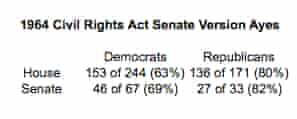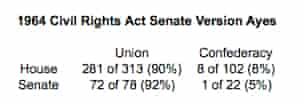Did Republicans in the 1800s Fight Agains Civil Rights
W ith Republicans having trouble with minorities, some similar to point out that the political party has a long history of standing up for civil rights compared to Democrats. Democrats, for example, were less probable to vote for the civil rights bills of the 1950s and 1960s. Democrats were more probable to filibuster. Even so, a closer await at the voting coalitions suggests a more complicated picture that ultimately explains why Republicans are not viewed every bit the party of civil rights.
Let's employ the 1964 Civil Rights Human action as our focal point. It was arguably the near important of the many civil rights bills passed in the middle function of the 20th century. It outlawed many types of racial and sexual discrimination, including access to hotels, restaurants, and theaters. In the words of Vice President Biden, it was a large "f-ing bargain".
When we await at the party vote in both houses of Congress, it fits the historical pattern. Republicans are more in favor of the bill:

80% of Republicans in the Firm and Senate voted for the beak. Less than seventy% of Democrats did. Indeed, Minority Leader Republican Everett Dirksen led the fight to end the filibuster. Meanwhile, Democrats such equally Richard Russell of Georgia and Strom Thurmond of South Carolina tried equally hard every bit they could to sustain a filibuster.
Of course, it was too Democrats who helped usher the pecker through the House, Senate, and ultimately a Democratic president who signed it into law. The bill wouldn't have passed without the back up of Bulk Leader Mike Mansfield of Montana, a Democrat. Majority Whip Hubert Humphrey, who basically divide the Democratic party in 2 with his 1948 Democratic National Convention speech calling for equal rights for all, kept tabs on individual members to ensure the beak had the numbers to overcome the delay.
Put another way, party amalgamation seems to exist somewhat predictive, but something seems to be missing. So, what factor did all-time predicting voting?
You don't need to know as well much history to understand that the South from the civil war to the Civil Rights Human action of 1964 tended to be opposed to minority rights. This factor was split up from party identification or ideology. We can easily control for this variable by breaking up the voting by those states that were part of the confederacy and those that were not.

You lot tin can run into that geography was far more predictive of voting coalitions on the Ceremonious Rights than political party affiliation. What linked Dirksen and Mansfield was the fact that they weren't from the south. In fact, xc% of members of Congress from states (or territories) that were role of the Union voted in favor of the act, while less than 10% of members of Congress from the old Confederate states voted for it. This 80pt deviation between regions is far greater than the 15pt divergence between parties.
But what happens when nosotros command for both political party amalgamation and region? As Sean Trende noted before this year, "sometimes relationships become apparent only after you control for other factors".

In this example, it becomes clear that Democrats in the north and the due south were more than probable to vote for the pecker than Republicans in the northward and due south respectively. This departure in both houses is statistically significant with over 95% confidence. Information technology but and so happened southerners made up a larger percentage of the Autonomous than Republican caucus, which created the initial impression than Republicans were more in favor of the act.
Nearly 100% of Wedlock state Democrats supported the 1964 Civil Rights Act compared to 85% of Republicans. None of the southern Republicans voted for the bill, while a small-scale percentage of southern Democrats did.
The same pattern holds true when looking at ideology instead of party affiliation. The folks over at Voteview.com, who created DW-nominate scores to measure the ideology of congressmen and senators, found that the more liberal a congressman or senator was the more likely he would vote for the Ceremonious Rights Act of 1964, once i controlled for a factor closely linked to geography.
That's why Strom Thurmond left the Democratic political party soon after the Ceremonious Correct Act passed. He recognized that of the two parties, information technology was the Republican party that was more than hospitable to his bulletin. The Republican candidate for president in 1964, Barry Goldwater, was ane of the few non-Confederate state senators to vote confronting the bill. He carried his home state of Arizona and swept the deep southern states – a first for a Republican ever.
Now, information technology wasn't that the Civil Rights Human action was what turned the Due south confronting the Democrats or minorities against Republicans. Those patterns, equally Trende showed, had been developing for a while. It was, even so, a manifestation of these growing coalitions. The South gradually became home to the conservative political party, while the north became home to the liberal party.
Today, the transformation is most complete. President Obama carried simply 18% of old Confederate states, while taking 62% of non-Confederate states in 2012. Simply 27% of southern senators are Democrats, while 62% of Union country senators are Democrats. And 29% of southern members in the House are Democrats compared to 54% in states or territories that were role of the Union.
Thus, it seems to me that minorities accept a pretty good thought of what they are doing when joining the Democratic party. They recognize that the Democratic political party of today looks and sounds a lot more than like the Democratic party of the North that with almost unity passed the Ceremonious Rights Bill of 1964 than the southern Democrats of the era who blocked it, and today would, like Strom Thurmond, likely be Republicans.
Source: https://www.theguardian.com/commentisfree/2013/aug/28/republicans-party-of-civil-rights
Postar um comentário for "Did Republicans in the 1800s Fight Agains Civil Rights"